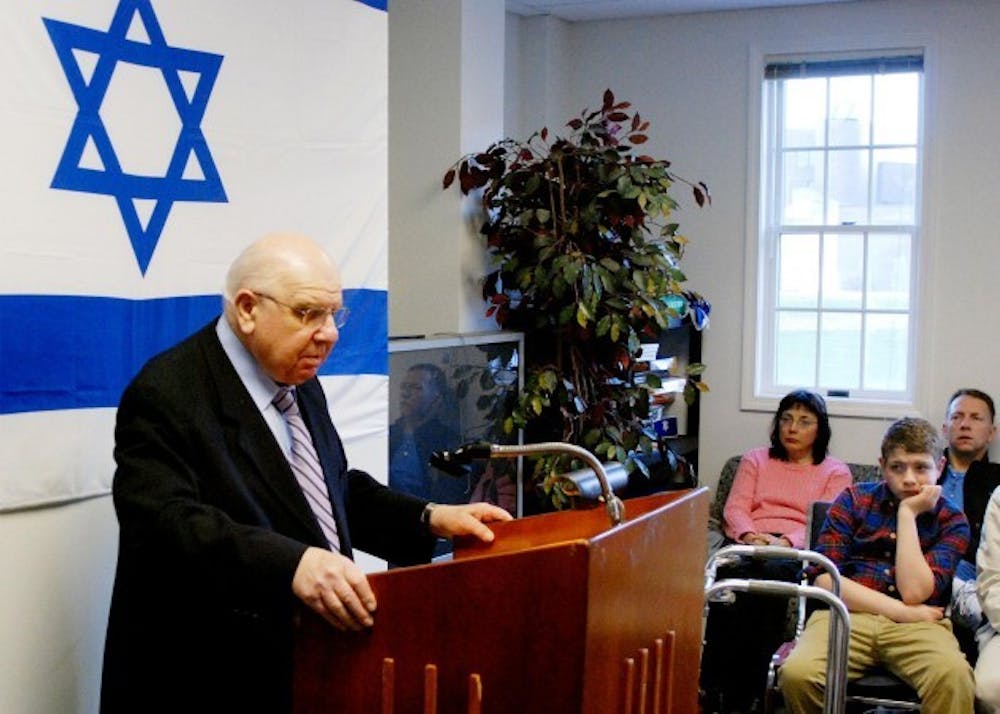At the age of 15, Joe Diamond awoke to German soldiers barging into his home. They dragged him and his family out into the streets of his small town within Czechoslovakia. As he was hauled away, all he could hear was the ridicule coming from the window of one of his neighbors: "Can I have your winter coat?"
The acts of slaughter and destruction committed during the Holocaust almost 70 years ago still resonate within many. The murder of over 11 million innocent people - of which 6 million were Jewish - between the years of 1933 and 1945 shows how low the depths of human morality can sink.
Hillel, the internationally run Jewish organization at UB, asked Joe Diamond, a Holocaust survivor, to speak this past Wednesday night. Diamond is a speaker for The Holocaust Resource Center of Buffalo. He is one of the few who survived the onslaught of the Germans during World War II in the Auschwitz concentration camp. He told his story to 60 people in the Hillel lounge.
The progression of the Nazi control over the 12-year period did not start off with the immediate killing of what Hitler and his regime considered "impure people." It was a slow progression, as described by Diamond: a snowball effect of basic human rights being taken from the Jewish people, eventually leading up to their entrapment.
The Jewish people, along with homosexuals, the handicapped, and others deemed "unfit to be part of the human race" in Hitler's eyes were shipped to concentration camps in boxcars on trains. The Germans packed them in like sardines, Diamond said, with a single bucket of water per car to survive the journey.
"It took a little longer for our train to get the people out," Diamond said. "I don't know what happened. So one of the storm troopers tells the service man that was in charge: 'What's taking so long to get these dummies out?' He said: 'Sir, some lady just gave birth and we're trying to protect the child.' The guy goes right up, picks up the little tiny baby and kicks it like a football."
Diamond will never forget these moments.
When he arrived, a German officer and two army men greeted Diamond, his 7-year-old brother, and his parents. His mother and brother were deemed "unfit" for slave labor and were sent off to a residential camp, also known as a gas chamber.
Diamond never saw his mother or younger brother again.
Diamond did anything he could to survive. Once he asked a German soldier for some spare bread. Diamond vividly remembers the officer throwing the piece on the ground only to watch 20 people dive toward it like animals.
"You [would] steal bread from your friend at night - who you were bunking with - to survive," Diamond said. "That's what they made out of us."
Out of the 3,500 people that were sent to Auschwitzconcentrationcamp, only 320 survived.
Diamond sometimes feels guilty for being alive because all of his childhood friends were killed.
He also feels lucky.
While standing in line to be executed by the gas chamber, a stranger tapped him on the shoulder and decided to save his life.
"He made me go up, up high on the attic by the roof, where I was able to get on the roof and I jumped down," Diamond said. "I crawled on my stomach until I got to an outhouse. I saw a Russian prisoner who was in charge of the outhouse and I asked him to hide me. He put me right in the hole, the manhole, and nailed the top down. Later I got mixed in with another group and they forgot about me, saving me from the gas chamber."
Diamond never goes a day without wondering why he was chosen by the stranger to be rescued.
"It really just shows me that people can get through struggles in their life," said Ilana Saffeir, a freshman occupational therapy major and a member of the Hillel board. "The Holocaust is a terrible event in history and to hear someone who survived it kind of gives me hope that I can do what I want in life, too, because it's not as hard as living through that event."
Saffeir has seen other Holocaust survivors in the past and every story seems different to her. She is amazed at how easily Diamond can recall details of the events that took place during the Holocaust so many years ago.
After the war ended, Diamond was liberated. He made the choice to come to America. There was nothing left for him in Czechoslovakia so he started a new life away from the country where he remembers so much pain.
He connected with the family he had in Buffalo in 1945. Upon arrival in the U.S., Diamond had two things: $5 and the will to live.
Jamie Schnitzer was partially responsible for bringing Diamond to speak and was very moved by what he had to say. Coming from a family where her grandfather was a Holocaust survivor, Schnitzer understands the toll that the emotional baggage can have on a survivor's family.
"It makes me feel sad, but it's good he's sharing the message," Schnitzer said.
Now, 67 years later, Diamond is happily married and living in Buffalo. He has two kids and four grandkids. He thanks God everyday for his unbelievable luck.
The scarcity of remaining Holocaust survivors only strengthens the power of Diamond's speech. These survivors won't be around forever and with their disappearance over time, it is society's responsibility to learn from them while there's still an opportunity.
Email: features@ubspectrum.com





